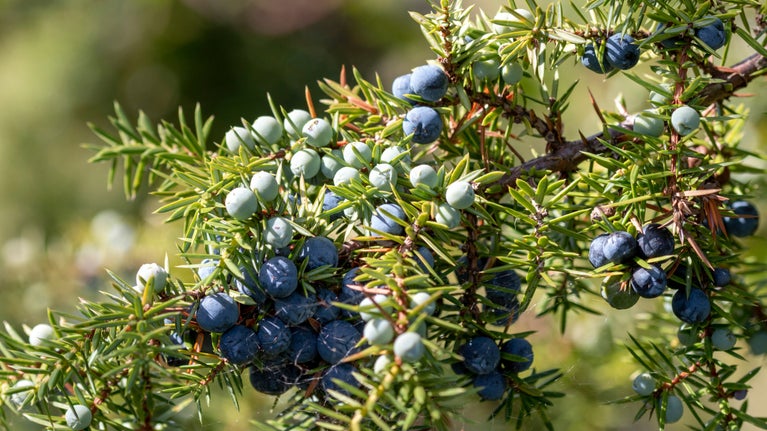Super seed smoothie helps struggling Chiltern juniper bushes back to strength
- Published:
- 13 December 2024

National Trust rangers in the Chiltern Hills in Buckinghamshire are lending a helping hand in the reintroduction of their local juniper trees by blending a super seed smoothie to halt the species' decline and encourage its long-term reestablishment across five sites.
Funded by the Natural England Species Recovery Programme Capital Grant Scheme [1] the conservation work is being done in partnership with Kew Garden’s Millennium Seed Bank. The National Trust led project will bolster the juniper’s natural regeneration through seed collection, germination and propagation.
Characteristic of chalky grasslands and lowlands in Southern Britain, common juniper is in decline and has been lost from nearly 50 per cent of its historic range [2] due to habitat loss and fragmentation, scrub encroachment, disease, and an inability to regenerate as aged populations reach the end of their lives. The species is also listed on the Section 41 list of a species of ‘principal importance for the conservation of biodiversity’ in England [3].
To create the smoothie, juniper berries are whizzed up with sand, warm water and eco detergent, which helps to strips the oils away from the seeds using a recipe from the Buckinghamshire and Milton Keynes Environmental Records Centre.
Made up of over 150,000 seeds collected from the berries of the declining species at West Wycombe, Bradenham, Coombe Hill, Pulpit Hill and Watlington Hill, the smoothie mix is spread over exposed bare chalk, helping to move fertile seeds to suitable ground to provide the plants with the best conditions for growth. To deter browsing deer from eating any emerging young juniper seedlings, hawthorn branches are laid over the newly spread seeds.
Matt Livarski-Bond, ranger for the National Trust in the Chiltern Hills said: “By collecting the berries and turning them into a smoothie, we are able to remove oils which inhibit germination. This is the same process as what would happen if they passed through the digestive system of any land animals and birds which eat them.
“It’s a very messy process – the berries are super sticky – and quite pungent. The ranger’s workshop will be smelling of gin for quite some time.”
The smoothie is then put in a sieve and rinsed in a bucket of warm water to wash the seeds clean, before spreading them out to dry off to stop the mix going mouldy. Once dry the seeds are finally mixed with dry sand to aid distribution.
The sprawling evergreen shrub, more often associated with gin, attracts a wide variety of insects, mammals and birds including song thrush and fieldfare that feed off the spiky plant’s berries.
The coniferous species has also struggled with competition from yew trees and a lack of ground disturbance preventing seeds taking root due to a lack of suitable niches. To counteract this National Trust rangers have created a series of scrapes across the Chiltern landscape, removing the topsoil to provide a more suitable seeding ground and improve the effectiveness of the seed-smoothie.
By establishing more juniper across the landscape, the project hopes to increase the number and health of the juniper population in the Chilterns through decreasing the distance between female specimens and their male counterparts, thereby allowing them to reproduce more effectively in the future.
Matt adds: “Junipers are not particularly fertile plants, as their reproduction depends in large parts on the proximity of male to female bushes, as well as other environmental factors such as pollution.
“At one of the project sites, Pulpit Hill, we found that berries were practically all infertile, with the nearest male plant located in Bradenham, which is seven miles away. This forced the Pulpit Hill junipers to rely on one singular plant to disperse its pollen. Overall, only 2 per cent of berries we harvested had viable seed, so these plants stood very little chance to reproduce on their own.”
Further efforts to safeguard the species are taking place at the Kew Millennium Seed Bank where juniper berries collected last year have been cleaned to remove the majority of dead and empty seeds. They were also germination-tested to inform future conservation efforts by improving the quality of the berry collection. The seeds are now with a specialist plant propagation company who will germinate the seeds and grow thousands of new juniper plants which will eventually be brought back to the Chilterns and planted on the sites that the seed originated from.
Dr Chris Cockel, UK Conservation Projects Coordinator at the Kew Millennium Seed Bank, where the seeds were stored, said: “Juniper is such an iconic species in the British landscape, but in general it is not as well recognised as other UK woody plants. This project is not only helping to revitalise the aging population of Juniper in the Chilterns but is also raising awareness of the threats facing this species and the urgent action that needs to be taken to halt its decline.
“Working in partnership with the National Trust is so important for us at Kew, combining our resources and know-how to safeguard this and other plant species and to halt the biodiversity crisis that the natural world is facing.”
Natural England’s Thames Solent Species Recovery Officer Jess Aldred added: “It is very exciting to see this collaborative and innovative conservation method in action, made possible by funding from Natural England’s Species Recovery Programme Capital Grant Scheme. With so many of our native species threatened with extinction, we do sometimes have to think outside the box when it comes to conserving them to ensure that they are not lost from Britain. We are delighted to be supporting this project which is helping address the Environment Act target to reduce the risk of species extinction, and we very much look forward to seeing results.”
To find out more about the National Trust’s conservation work in the Chilterns, visit: www.nationaltrust.org.uk/chilterns-countryside